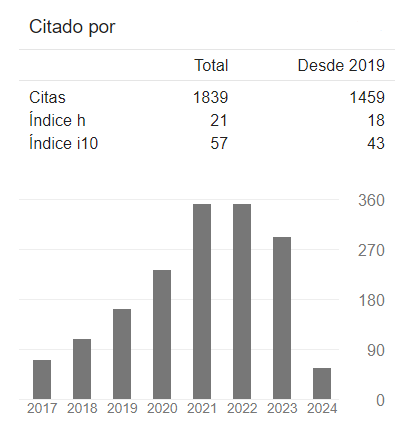Legal analysis of standards with a gender perspective on women deprived of liberty in judgments declaring the state of affairs unconstitutional
DOI:
https://doi.org/10.24142/raju.v19n38a2Keywords:
gender perspective, unconstitutional state of affairs, custodial sentences, human rights, women, fundamental rightsAbstract
The unconstitutional state of affairs —hereinafter ECI— is a figure that calls for the inefficiency of a government in addressing needs in the country’s prisons and with it, its responsibility in the massive violation of fundamental rights. The Constitutional Court, using this figure, gives a series of orders to the Colombian state where it recommends a large number of reforms in the face of this problem of massive and systematic violation of human rights. However, when addressing the problem of prison overcrowding, the interpreter of the constitution does not apply a gender approach that allows the rights of women imprisoned from their freedom in the country’s penitentiary centers to be put into practice. To then address an analysis of the gender approach within the different sentences that declare and extend the unconstitutional state of affairs, it is essential to review from the methodology that Alda Facio proposes in her book “When gender sounds it brings changes”, in which which this author has defined as a research methodology with a gender focus on legal norms to apply it to sentences that declare and extend the unconstitutional state of affairs and with this, make visible the voices of women who are deprived of their liberty in front of to the charges of their demands.
References
Charlesworth, H., Chinkin, C. y Wright, S. (2017). Feminist approaches to international law. The American Journal of International Law, 85(4), 613-645.
Corte Constitucional (1997). Sentencia T 559 de 1997. Magistrado ponente: Fernando Herrera Delgado. https://www.corteconstitucional.gov.co/relatoria/1997/C-597-97.htm.
Corte Constitucional (1998). Sentencia T 153 de 1998. Magistrado ponente: Eduardo Cifuentes Muñoz. https://www.corteconstitucional.gov.co/relatoria/1998/t-153-98.htm.
Corte Constitucional (2002). Auto 121 de 2018. Magistrada ponente: Gloria Stella Ortiz Delgado. https://www.corteconstitucional.gov.co/relatoria/autos/2018/a121-18.htm.
Corte Constitucional (2013). Sentencia T 388 de 2013. Magistrada ponente: María Victoria Calle Correa. https://www.corteconstitucional.gov.co/relatoria/2013/T-388-13.htm.
Corte Constitucional (2015). Sentencia T 762 de 2015. Magistrada ponente: Gloria Stella Ortiz Delgado. https://www.corteconstitucional.gov.co/relatoria/2015/t-762-15.htm.
Corte Constitucional (2018). Sentencia T 268 de 2018. Magistrado ponente: Carlos Bernal Pulido. https://www.corteconstitucional.gov.co/relatoria/2018/T-268-18.htm.
Corte Constitucional (2022). Sentencia T 122 de 2022. Magistrados ponentes: Diana Fajardo Rivera, Cristina Pardo Schlesinger y José Fernando Reyes Cuartas. https://www.corteconstitucional.gov.co/relatoria/2022/SU122-22.htm.
Facio, A. (1992). Cuando el género suena cambios trae. Una metodología para el análisis de género del fenómeno legal. Instituto Latinoamericano de las Naciones Unidas para la Prevención del Delito y el Tratamiento del Delincuente (ILANUD). https://catedraunescodh.unam.mx/catedra/CONACYT/16_DiplomadoMujeres/lecturas/modulo2/1_Alda%20facio_Cuando_el_gen_suena_cambios_trae.pdf.
Galeano, M. E. (2011). Diseño de proyectos en la investigación cualitativa.Componentes del diseño cualitativo. Tend.Ret, (16), 313-316. https://dialnet.unirioja.es/descarga/articulo/4929358.pdf.
Giraldo, K. J. (2021). Cárceles para mujeres: La necesidad de implementar el enfoque de género en el proceso de superación del estado de cosas inconstitucional en materia penitenciaria y carcelaria en Colombia. Estudios de Derecho, 78(171), 88-116. https://revistas.udea.edu.co/index.php/red/article/view/342877/20804869.
Hernández, R., Fernández, C. y Baptista, P. (2014). Metodología de la investigación. 6.a ed. McGraw-Hill. https://periodicooficial.jalisco.gob.mx/sites/periodicooficial.jalisco.gob.mx/files/metodologia_de_la_investigacion_-_roberto_hernandez_sampieri.pdf.
Legal Information Institute (s. f.). Political Question Doctrine. Cornell Law School. https://www.law.cornell.edu/wex/political_question_doctrine.
MacKinnon, C. (1995). Hacia una teoría feminista del Estado. Cátedra. Sánchez, J. C. (s. f.) Historias de vida sobre mujer y prisión en Colombia: La transformación del silencio. [Trabajo de grado para optar al título de magíster en Sociología]. Universidad del Rosario, Bogotá, Colombia. https://repositorio.uniandes.edu.co/bitstream/handle/1992/57021/Historias%20de%20vida%20sobre%20mujer%20y%20prisi%c3%b3n%20en%20Colombia-%20La%20transformaci%c3%b3n%20del%20silencio%20%282%29.pdf?sequence=4&isAllowed=y.
Sánchez, A. L., Rodríguez, L., Fondevila, G. y Morad, J. (2018). Mujeres y prisión en Colombia: Desafíos para una política criminal con un enfoque de género. Pontificia Universidad Javeriana, Comité Internacional de la Cruz Roja (CICR), Centro de Investigación y Docencia Económicas (CIDE). https://repository.javeriana.edu.co/handle/10554/41010.
Sandoval, C. (2002). Investigación cualitativa. Instituto Colombiano para el Fomento de la Educación Superior, Primera y Segunda Unidad. http://panel.inkuba.com/sites/2/archivos/manual%20colombia%20cualitativo.pdf.
Sotomayor, J. O. (2007). Las recientes reformas penales en Colombia: un ejemplo de la irracionalidad legislativa. Nuevo Foro Penal, 3(71), 13-66.
Published
How to Cite
Issue
Section
License
Copyright (c) 2024 Eddy Karina Mena Pérez, Clara María Mira González

This work is licensed under a Creative Commons Attribution-NonCommercial-ShareAlike 4.0 International License.
La rivista consente all'autore (s) di mantenere i diritti di pubblicazione senza restrizioni.
Le journal permet à l'auteur (s) de conserver les droits de publication sans restrictions.
The journal allows the author (s) to retain publication rights without restrictions.
La revista le permite al autor(es) retener los derechos de publicación sin restricciones
Die Zeitschrift ermöglicht es dem / den Autor (en), Veröffentlichungsrechte ohne Einschränkungen zu behalten.
A revista permite que os autores mantenham os direitos de publicação sem restrições.











































